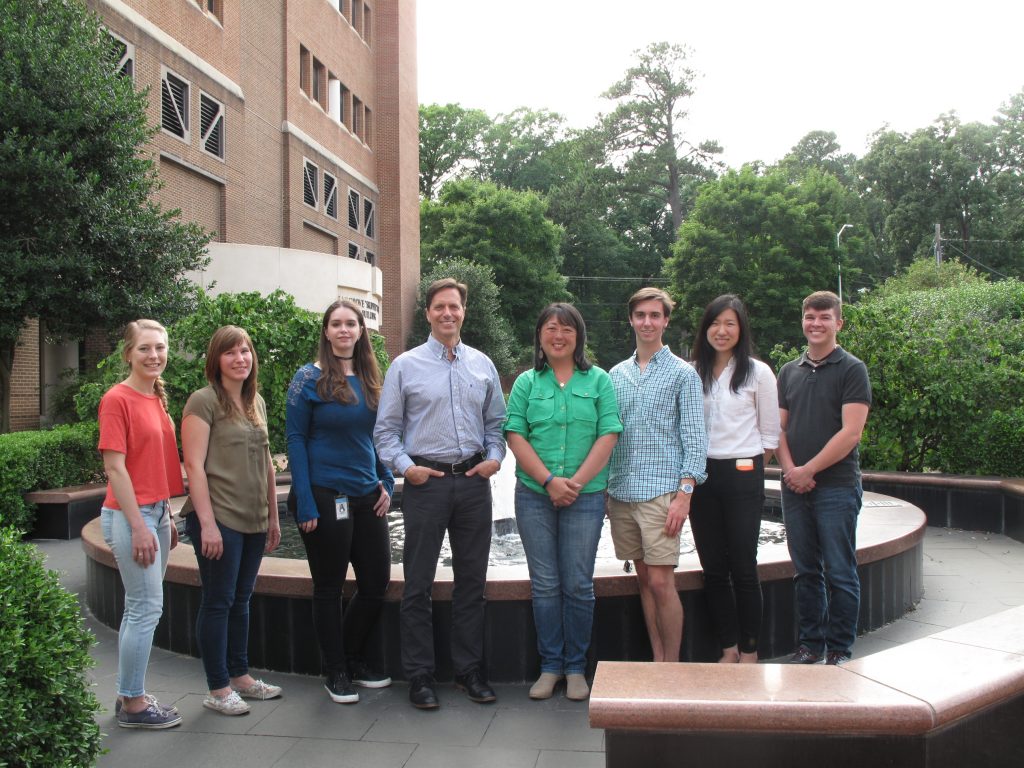Neurobehavioral Pharmacology
Left to Right: : Katarina Swaim, Valerie Eastman, Abi Agoglia, Dr. Clyde Hodge, Dr. Sara Faccidomo, Chris Hodge, Michelle Kim, Seth Taylor
Goals
- To discover the neural circuits and molecular mechanisms that mediate the reinforcing and pleasurable subjective effects of alcohol.
- To elucidate molecular mechanisms of alcohol-induced changes in mood (i.e., depression).
- To identify the long-term effects of alcohol exposure during adolescence.
- To utilize our understanding of reinforcement to identify novel neural targets and validate pharmacological compounds that may be used to treat problems associated with alcohol abuse and alcoholism
Research Contributions
Discovered that protracted abstinence from voluntary alcohol drinking is associated with an increase in depression-like behavior:
- Depression-like behavior following abstinence is associated with reduced hippocampal neurogenesis in mice.
- Deficits in behavior and neurogenesis are prevented by treatment with an antidepressant during abstinence.
Identified the ERK/MAPK cell signaling pathway as a critical mediator of a number of alcohol-related behavioral pathologies:
- Found that inhibition of the MAPK/ERK1/2 intracellular signaling cascade selectively increases ethanol self-administration and reinstatement of ethanol-seeking behavior.
- Determined that ERK1/2 activity is altered in specific brain regions following cue-induced reinstatement of ethanol-seeking and that inhibiting ERK1/2 activity alters reinstatement behavior.
- Determined for the first time that voluntary alcohol drinking is associated with an adaptive downregulation in p-ERK1/2 IR in the mammalian brain.
- Discovered that acute alcohol rapidly activates extracellular-signal regulated kinase in the mammalian brain.
Discovered that pharmacological inhibition of mGlu5 receptors:
- Decreases ethanol self-administration in rat and mouse models.
- Reduces the motivation to self-administer ethanol as measured by progressive ratio techniques..
- Blocks the repeated alcohol deprivation effect (a model of relapse-like behavior) in alcohol preferring P-rats
- Inhibits cue-induced reinstatement of alcohol-seeking behavior
- Determined that mGlu5 receptors, but not mGlu2/3 receptors, in the nucleus accumbens functionally regulate alcohol self-administration.
- Found that mGlu5 receptors in the nucleus accumbens are critical for the expression of alcohol’s interoceptive (i.e., discriminative stimulus) properties.
Discovered that Protein Kinase C regulates neurobehavioral responses to ethanol:
- Using gene knockout mice, shown that Protein Kinase C – epsilon regulates alcohol drinking, reinforcement, sensitivity, withdrawal, and mesolimbic dopamine release through enhancement of GABAA receptor function.
- Discovered that Protein Kinase C – epsilon is required for GABAergic modulation of alcohol drinking.
- Showed that acute alcohol rapidly activates Protein Kinase C – gamma in the mammalian brain.

